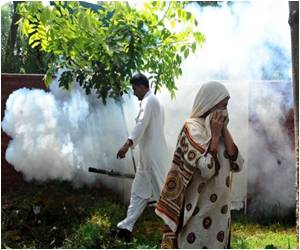Medical stores have doubled prices of insecticide sprays, preventive lotions and medicines. According to them, wholesalers and dealers have revised the prices. Regular insecticide sprays that were originally priced at Rs100-200, now come for a whopping Rs400 or more. Lotions worth Rs50 or more now cost more than a hundred. Since the demand is much greater than the supply, black market has also thrived, and the suppliers are minting money.
They are allegedly hoarding and significantly marking up on these items.
In the wake of the threat, private fumigation companies have had a windfall. Last Monday, the city district government registered eight cases against traders selling fumigation machines and spraying medicines at high prices. Not only private companies, but even individuals with manual pumps, insecticides and sprays are now offering their services door to door, and ask for hefty sums in return of their services. Since there is little trust in the government and yet the times are desperate, many people buy whatever is sold, often being duped in the process.
These sprays and insecticides are supposedly more efficient and kill mosquitoes and other insects quickly. And the fear of dengue drives people to take this expensive measure, especially when there are children in the family. But these private endeavours can easily prove toxic since these chemicals are not monitored by experts or regulators. Not only are many of these sprays cancerous, they also persist for a long time making underground water bodies, soil and other surfaces poisonous. Long-term exposure is hazardous. If the spray is not effective enough, it might make the mosquitoes more resistant and deadly. Therefore, if private fumigation firms are to operate, they should ideally be regulated under the law and the public should be made more aware about the usage of such chemicals.
Many people resent that the government has not been efficient in spraying and hence prefer private firms since the latter do often wipe out insects swiftly, no matter what the side effects. Nonetheless, the quicker these sprays wipe out pathogens and the wider their range, the more toxic they might be to human health. And the mosquitoes from other areas can and sometimes do re-appear in your vicinity after some time.
Rana Mehmood, owner of the fumigation company Rana Spray Corporation, says that his company is actually protecting the citizens from dengue by filling the gap left behind by the government. He particularly prides in the efficiency of his sprays as compared to the Government and denies exploiting or gouging anyone. He charges two thousand for fumigating a ten-marla building and a thousand more for a double storey building. But he admits that the spray he uses can be expensive for some.
Laboratories are adding to the patients’ miseries. Some are still charging more than the government assigned price for the CBC test. However, two of the city’s major labs have faced closure when caught over-charging by the government and apparently more people are now availing of the government subsidy. Usually, when the government fixes a price, it subsidizes for the owner too; in this case the pharmacies are paying the difference from their own pockets. Some labs have reduced their testing capacity and others don’t accept the blood samples till offered extra money. This is usually just seventy to hundred rupees more than the official price.
But all medical businesses have not thrived since the outbreak. Some have paid a heavy price.
One pharmacy worker denied any fluctuations in sales and prices. However, an official from a well-known pharmacy chain told TNS, “Small and individual stores fake shortage to ask for the price they want. The bigger stores and chain pharmacies can lift medicines from other cities, like we just attained Panadol from our Kasur outlet, where the epidemic is less intense.” He confesses that sometimes prices are increased from the distributor’s end, but the retailer can also charge an additional ten rupees. Mospel was Rs105 now it is 110; Mortein spray was Rs 160 now it is 170.
Khwaja Nazir Ahmer, the PR manager of Shaukat Khanum says the hospital was loosing 300,000 rupees (which could be used for cancer patients) daily for these dengue tests. He said the original cost is Rs240, whereas they are forced to charge only Rs90. However, Muhammad Ilyas Rana, manager Zeenat Labortries says the test costs Rs110 and the yearly profit of most laboratories can allow for such limited cross-subsidies during a genuine emergency. “It is just 10 to 15 rupees that we reduce, and we do some 35 or so tests. It is somewhat affordable for the moment.”
The prices of apple juice, papaya juice and lemon juice, which are being used to cure dengue, have also gone up in the market since the spread of dengue virus. The leaf of the papaya tree is also being sold in the market for Rs100 to Rs200 per leaf.
Since the imposition of Section 144, a ban on washing cars has left thousands of car washers for private houses and petrol pumps, jobless. This was because of the fears that standing freshwater puddles might create more dengue cases. The government has defended its situation saying these are exceptionally critical times and tough decisions have to be made. Yet these daily-wagers have been left struggling for bread and some might resort to crimes out of desperation.
The times are indeed critical and drastic policies required. But in a hurry to avoid dengue, we should not overlook the impact our short-term decisions can have on the people.
This piece was first published in The News on Sunday.

No comments:
Post a Comment